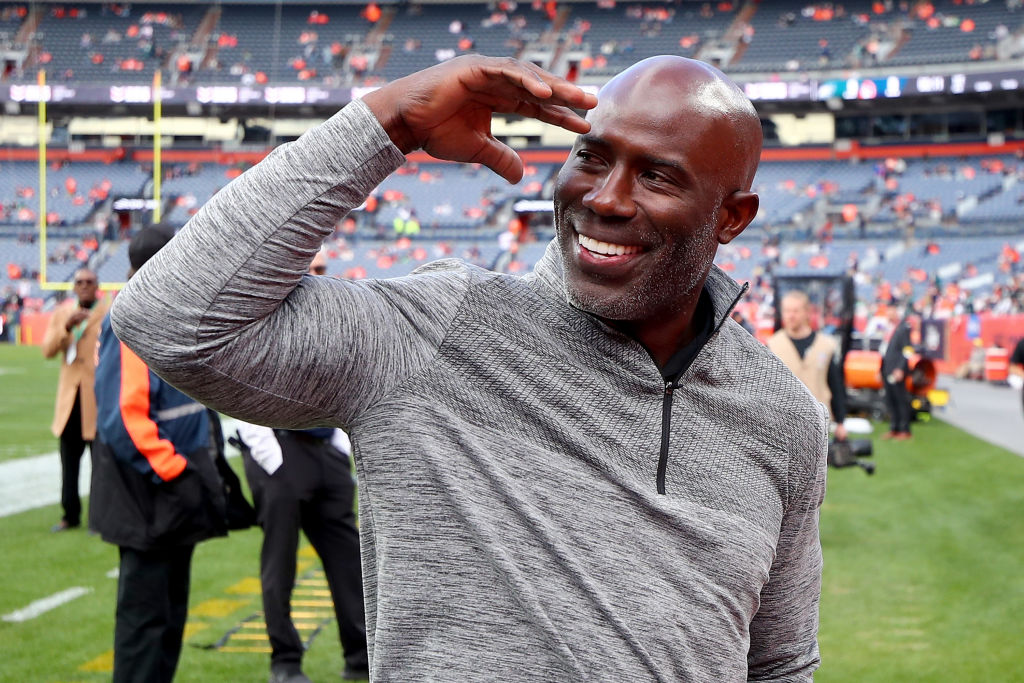Two-time Super Bowl champion Terrell Davis is taking the lessons of his past and educating the next generation of athletes.
The San Diego, CA-native was once a student-athlete, playing for Long Beach State University in California before transferring to the University of Georgia after Long Beach’s football program was shut down. In 1995, Davis’ talents would bring him to the bright lights of the NFL field, with him being drafted by the Denver Broncos. The team signed him under a three-year contract valued at $484,000, which included a $38,000 signing bonus, mentioned Spotrac.
Early Financial Mishaps
He recalled having no prior financial education when he entered the league, but he had a realization about money management through veteran teammate Simon Raynard Fletcher who one day was driving him to a nearby hotel following training camp.
“I noticed on the passenger side of his car when I got in, it was a bunch of envelopes and there was a bunch of checks,” Davis told AFROTECH™. “I could tell there were checks and some were open somewhere, and he just kind of scraped them off the seat onto the floor. And I can see ’em, it was like a couple thousand dollars on each check. So, he gave me a little bit of advice right there, and he’s like, ‘Hey man. You gotta spend your money like you’re broke.’ So, the way I took it was all those checks, he didn’t cash, so he wasn’t spending any money.”
He added, “I remember thinking about like, wow, that’s pretty impressive to see this guy is in the league not spending his money, ’cause I thought that’s what everybody did in the league. And he was a little frugal guy. His car was a decent car, wasn’t anything over the top. So he was my first experience seeing a pro football player kind of living a lifestyle that was below his means. And that registered with me, and I kind of held onto that and tried to use that model going forward.”
That moment with Fletcher would be one of two situations that opened up Davis’ eyes to the realities of financial management. Following his college days and prior to stepping into the NFL, he secured a deal with card company Signatures upon leaving college, which landed him a $35,000 check, but he admits he mismanaged it.
“Believe me, that money was spent before I had even deposited the check. It was mentally spent,” he recalled. “The problem with that was that check was a 1099 check. So the taxes weren’t taken out yet. And I just thought, ‘Hey this is $35,000, I can go spend it.’ And I didn’t do anything stupid, but I did go and bought me some clothes. Of course I have family, and I just wanted to give my mom some money and all that stuff, so that money was gone really fast. Then I realized when tax time came around, that check was in my taxes and I had to pay — I had to actually write another check to pay the taxes on that.”
Davis would ultimately hire an advisor and later transition to being led by a team of advisors who operated as a board. This was essential as his earnings by the end of his career amounted to $18.9 million, per Spotrac. He retired in 2002 having been an NFL and Super Bowl MVP and two-time Super Bowl champion.
Partnering With Wells Fargo
Now beyond the field, Davis has maintained the lessons from the league and is an investor in real estate while simultaneously juggling his role as a co-founder of sports drink company DEFY. He also took his expertise to educate others as a partner at Alpha 1 Tax & Wealth since 2018, his LinkedIn states. Not to mention, he is a mentor of the youth and has visited schools to teach children about savings and investing. Additionally, he is currently working alongside Wells Fargo for its content series on financial education for athletes in the midst of the new name, image, and likeness (NIL) terrain, a press release notes.
Through their efforts, he is looking to position student-athletes to maximize their potential with NILs. This was exhibited through the content series released on Oct. 3, which featured Michael Proctor, district branch network senior manager for Wells Fargo, and Davis’ mentee Roderick Robinson II, who is the current running back at his Georgia alma mater.
“I’ve been fortunate, and since I’ve retired I’ve always tried to mentor the next generation on and off the field,” Davis said. “I have information, I have experience that I can share with somebody else. And if I have that and you have knowledge and experience and you don’t share it with somebody else, to me that’s a crime you know. And you’re not paying it forward if you’re not trying to find young people, when you’ve already been on a path and you’re just trying to make sure that they don’t have the same pitfall. There’s all kinds of traps along the way. And I would not feel good if I did not share that information.”


